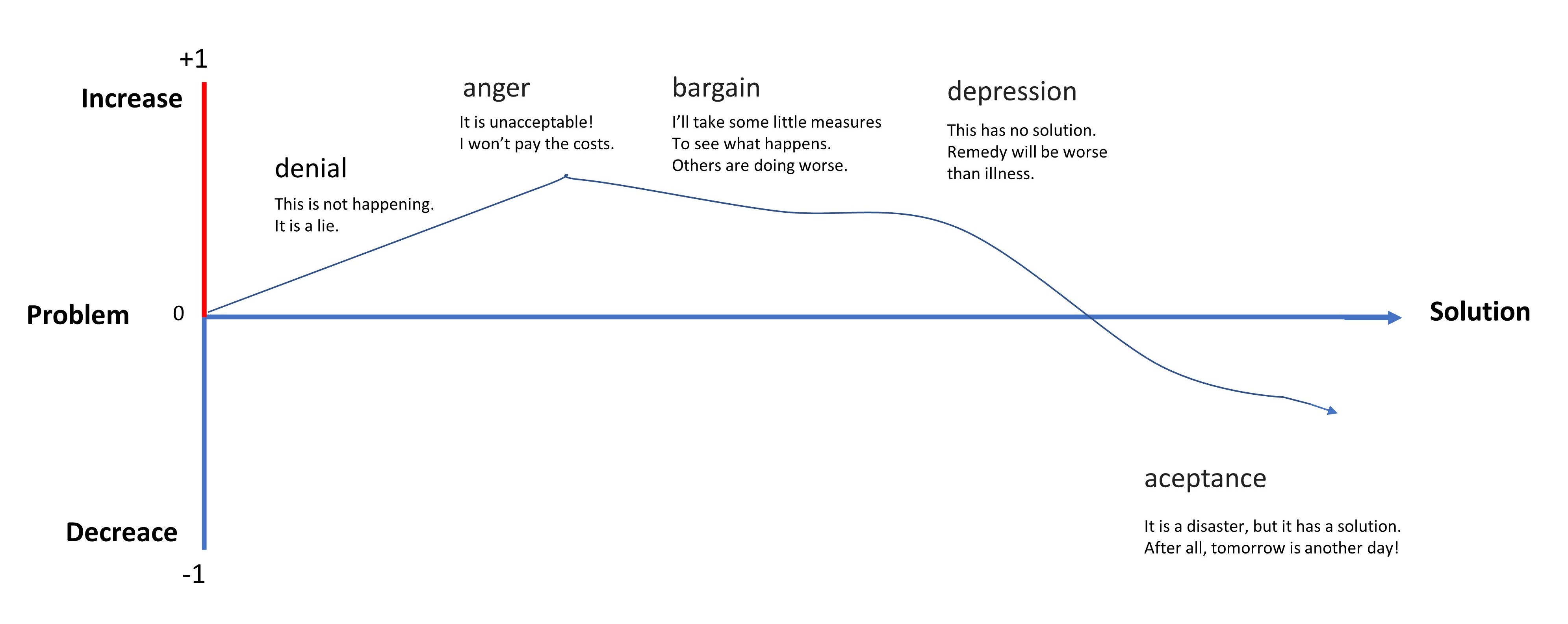«… we have examples that could be denial with the notorious contradictions in the UK with Boris Johnson or in Spain with Pedro Sánchez (first weeks of March); or more recently, Donald Trump and his counterpart López Obrador in Mexico while both seem to be in the middle of the negotiation stage«.
When an event of natural or human origins impacts an organization and causes damage to society, a financial disruption, and tests our leaderships we can undoubtedly say that that event has caused a crisis.
To understand our emotional response to a crisis, it’s useful to recollect the Kubler-Ross model and review the list of techniques that we generally use to cope with threats and changes, which are: Denial, Anger, Bargain, Depression, and Acceptance.
This model has detractors but its advantage is that its structure provides phases (which can be intermingled) to elaborate a road map to walk through the challenges that change demands.
However, expecting to match our individual emotional pace with the speed for right answers that a crisis can demand is a luxury that very often can’t be afforded by large organizations. For this reason, the professionalization in the crisis management has been a historical priority for the survival of the Nation-State model and more recently for businesses.
In this regard, crisis management experts insist that the real focus is not to evaluate “if a crisis will actually happen” but rather to follow the maxim of «when will it happen?». Along with this maxim, it’s common to classify certain institutions per se as crisis management and prevention units (Army, police, fire, health, insurance, etc.). For sure, it’s still too early to draw conclusions about the true impact of Covid-19 and to evaluate the crisis management performance of each one of the governments (and the WHO), but apparently the maxim of being prepared was not the rule this time. And then again, it seems that apart from few exceptions that quickly accepted that the Covid-19 was a real threat to their security (South Korea, Taiwan, Hong Kong, and Russia) the Western States fell, at least prima facie, in denial, shock , and / or the negotiation stages before taking action.
In this sense, we have examples that could be denial with the notorious contradictions in the UK with Boris Johnson or in Spain with Pedro Sánchez (first weeks of March); or more recently, Donald Trump and his counterpart López Obrador in Mexico while both seem to be in the middle of the negotiation stage.
What we can expect in any crisis management at the decision maker level (planned in 6, 12, 24, or 36 months) was briefly summarized by Jack Welch as the Five Steps to Crisis Management:
- The problem is worse than what is said in the first report. Subordinates have typically waited before reporting the problem.
- The news will come out and the whole world will soon know it.
- The organization will be portrayed in the worst possible way.
- You will have to make positive changes for the future. Things must change to prevent problems from happening again (and some responsible for the crisis mismanagement will lose their jobs).
- Assume you will survive and when you do, you will be a better organization.
It is certainly too soon to draw conclusions and establish an opinion about the overall performance of the institutions in charge, while currently, even the nature of the virus and its vaccination is still under research. No one knows which state formula will prove right until we have concluding results. However, it’s not too soon to start reflecting in what just happened to calculate more assertive next steps.

